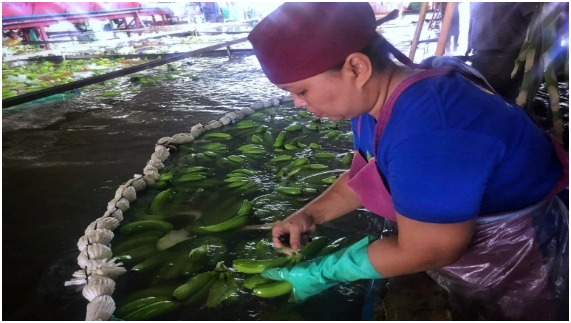Gender equality through improved labour standards compliance
Nearly two million women in the Philippines work in agriculture, fishing, and mining sectors in 2020. Yet, their role and contribution to achieve sustainable development are often overlooked and undermined. They also face greater barriers on access to decent work.
"Women rural workers are more likely to earn less than men since their jobs are in lower tiers of the supply chain with long working hours, poor working conditions and are equally hazardous and precarious as that of men," said Director Khalid Hassan of the International Labour Organization (ILO) Country Office for the Philippines .
To shed light on working conditions of women rural workers, the ILO through its project on rural women workers convened a dialogue on gender equality and labour standards. As part of Womens Month, the forum served as platform to tackle services and programmes on gender equality by government, workers, and employers organizations.
"Women play an important role in the economic survival of their families, but they are at a greater disadvantage in terms of income, employment and land ownership, especially those in the rural sector," said Executive Director Kristine Yuson-Chaves of the Philippine Commission on Women (PCW) .
In the dialogue, women rural workers raised concerns on solo parent’s benefits, including workplace violence and harassment. PCW welcomed it as an opportunity to know more about challenges on implementation of laws on women’s welfare. PCW recommended resolving at the local government level. Additionally, it is critical to strengthen links between trade, economic and labour policies with agriculture and other rural sectors as well as ensure decent work.
According to the ILO's recent Care at Work Report , while maternity protection and other care-related leave benefits and services, such as affordable, accessible, and professional childcare and long-term care, are considered universal, they remain unmet, particularly in rural areas.
The Department of Labor and Employment (DOLE) presented the expanded maternity benefits including labour laws in the Philippines.
"There is high compliance of formal establishments inspected on gender indicators such as implementation of expanded maternity leave, solo parent leave, anti-sexual harassment policies, establishment of lactation stations. DOLE however continues to focus on non-compliant establishments and provide guidance to be more be compliant," as Executive Director Ma. Karina Trayvilla-Perida of the DOLE-Bureau of Workers with Special Concerns shared.
DOLE will further look at maternity leave compliance, including paternity leave as raised by IndustriAll , a workers’ organization during the dialogue. Workers further brought the need to fulfill access to social protection, maternity protection, and other health care benefits.
Social dialogue is key to advance gender equality and ensure compliance to labour standards. Employers through the Employers’ Confederation of the Philippines (ECOP) cited that the COVID-19 pandemic will continue to take its toll on women who are more significantly burned out. Workers also underscored that womens participation is vital in negotiations for better working conditions.
The ILO Project on Improving Workers' Rights in the Rural Sectors of the Indo-Pacific with a focus on Women organized the dialogue held on 16 March 2022. The project is funded by the United States Department of Labor (US DOL) and implemented as part of the ILO Flagship Programme on Safety + Health for All , aimed at improving the safety and health of workers globally.



